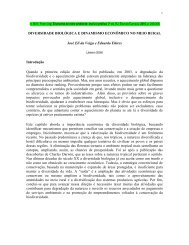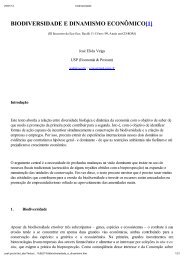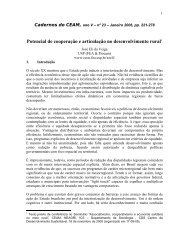sustainable development 20 years on from the ... - José Eli da Veiga
sustainable development 20 years on from the ... - José Eli da Veiga
sustainable development 20 years on from the ... - José Eli da Veiga
Create successful ePaper yourself
Turn your PDF publications into a flip-book with our unique Google optimized e-Paper software.
170<br />
requirements of legislati<strong>on</strong>; 14 and <strong>the</strong> <str<strong>on</strong>g>development</str<strong>on</strong>g> of corporate social resp<strong>on</strong>sibility strategies. This<br />
trend is explained, am<strong>on</strong>g o<strong>the</strong>r factors, by <strong>the</strong> <str<strong>on</strong>g>development</str<strong>on</strong>g> of envir<strong>on</strong>mental legislati<strong>on</strong>, by a<br />
changing ethical perspective and by market preferences, particularly in export markets. Initiatives that<br />
promote corporate resp<strong>on</strong>sibility —such as <strong>the</strong> United Nati<strong>on</strong>s Global Compact — have taken hold in a<br />
growing number of firms in Latin America and <strong>the</strong> Caribbean (United Nati<strong>on</strong>s, <str<strong>on</strong>g>20</str<strong>on</strong>g>10). Global Compact<br />
members c<strong>on</strong>tribute in various ways to <strong>the</strong> Millennium Development Goals, a subject that has been<br />
tackled by <strong>the</strong> Regi<strong>on</strong>al Centre for Latin America and <strong>the</strong> Caribbean in support of <strong>the</strong> United Nati<strong>on</strong>s<br />
Global Compact, set up in <str<strong>on</strong>g>20</str<strong>on</strong>g>09. 15<br />
A company’s envir<strong>on</strong>mental impact largely depends <strong>on</strong> <strong>the</strong> nature of its activities. A significant<br />
proporti<strong>on</strong> of productive activity in <strong>the</strong> regi<strong>on</strong> c<strong>on</strong>cerns sectors and activities that are highly sensitive<br />
envir<strong>on</strong>mentally, since <strong>the</strong>y involve <strong>the</strong> extracti<strong>on</strong> of natural resources, compete for land use with<br />
ecosystem services such as carb<strong>on</strong> dioxide capture and biodiversity protecti<strong>on</strong>, or are energy-intensive. Of<br />
<strong>the</strong> 50 largest firms in <strong>the</strong> regi<strong>on</strong>, 25 (including <strong>the</strong> five largest) operate in primary activities or <strong>the</strong><br />
processing of natural resources (hydrocarb<strong>on</strong>s, mining, agribusiness, steel-metallurgy, petrochemicals).<br />
Many smaller firms, including small and medium-sized enterprises (SMEs), operate within producti<strong>on</strong><br />
chains associated with <strong>the</strong> large firms in <strong>the</strong>se sectors (United Nati<strong>on</strong>s, <str<strong>on</strong>g>20</str<strong>on</strong>g>10), making envir<strong>on</strong>mental<br />
management particularly important for <strong>the</strong> regi<strong>on</strong>.<br />
However, progress to <strong>da</strong>te in terms of business behaviour varies according to company size,<br />
ownership and financing mechanisms, am<strong>on</strong>g o<strong>the</strong>r points (United Nati<strong>on</strong>s, <str<strong>on</strong>g>20</str<strong>on</strong>g>10). Large firms —whe<strong>the</strong>r<br />
transnati<strong>on</strong>al or local— linked to <strong>the</strong> global market through exports, investments and access to<br />
internati<strong>on</strong>al capital markets, have advantages over smaller businesses, both in terms of <strong>the</strong>ir capacity to<br />
implement envir<strong>on</strong>mental management measures and corporate social resp<strong>on</strong>sibility strategies and in<br />
terms of <strong>the</strong> cost-effectiveness of such initiatives. Critics also claim that <strong>the</strong>se acti<strong>on</strong>s (which are usually<br />
intensively publicized) have a relatively small impact <strong>on</strong> <strong>the</strong> envir<strong>on</strong>ment and communities and do not<br />
compensate for <strong>the</strong> broader envir<strong>on</strong>mental <strong>da</strong>mage and social c<strong>on</strong>sequences inherent in <strong>the</strong> scale of <strong>the</strong>ir<br />
activities and in producti<strong>on</strong> patterns (United Nati<strong>on</strong>s, <str<strong>on</strong>g>20</str<strong>on</strong>g>10).<br />
In additi<strong>on</strong>, SMEs often lack access to capital or <strong>the</strong> ability to make significant changes to <strong>the</strong>ir<br />
producti<strong>on</strong> methods. Numerous SMEs still do not comply with current envir<strong>on</strong>mental regulati<strong>on</strong>s, often<br />
because managers are unsure of <strong>the</strong> advantages of investing in envir<strong>on</strong>mental management and <strong>the</strong><br />
envir<strong>on</strong>mental impact <strong>the</strong>ir companies are causing (Correa, Van Hoof and Nuñez, <str<strong>on</strong>g>20</str<strong>on</strong>g>10).<br />
Organizati<strong>on</strong>s in a number of countries and territories in <strong>the</strong> regi<strong>on</strong> have joined <strong>the</strong> World<br />
Business Council for Sustainable Development (WBCSD), through which <strong>the</strong>y provide member firms<br />
with sustainability-related technology disseminati<strong>on</strong> services, innovative approaches to<br />
entrepreneurship, linkages with suppliers of products and services c<strong>on</strong>ducive to <str<strong>on</strong>g>sustainable</str<strong>on</strong>g><br />
<str<strong>on</strong>g>development</str<strong>on</strong>g> and o<strong>the</strong>r support (see table III.2). 16 Over <strong>the</strong> last few <str<strong>on</strong>g>years</str<strong>on</strong>g>, instruments have been<br />
implemented to promote triple-bottom-line management (ec<strong>on</strong>omic-financial, envir<strong>on</strong>mental and<br />
social) am<strong>on</strong>g companies. These include <strong>the</strong> Internati<strong>on</strong>al Finance Corporati<strong>on</strong> (IFC) guidelines for<br />
implementing and evaluating resp<strong>on</strong>sible management systems; <strong>the</strong> guide for SMEs of <strong>the</strong> Global<br />
14<br />
15<br />
16<br />
For example, <strong>the</strong> number of firms with ISO 14001 certificati<strong>on</strong> has g<strong>on</strong>e up. Never<strong>the</strong>less, <strong>the</strong> number of<br />
certified companies is still very low. Only 6,423 firms in <strong>the</strong> regi<strong>on</strong> had been certified in <str<strong>on</strong>g>20</str<strong>on</strong>g>10, while in Europe<br />
<strong>the</strong>re were 103,126 and in <strong>the</strong> Far East 124,922. See [<strong>on</strong>line] http://www.iso.org/iso/iso-survey<str<strong>on</strong>g>20</str<strong>on</strong>g>10.pdf [<strong>da</strong>te of<br />
reference: December <str<strong>on</strong>g>20</str<strong>on</strong>g>11]<br />
See [<strong>on</strong>line] http://www.centroregi<strong>on</strong>alpmal.org/.<br />
See WBCSD [<strong>on</strong>line] http://www.wbcsd.org/.













